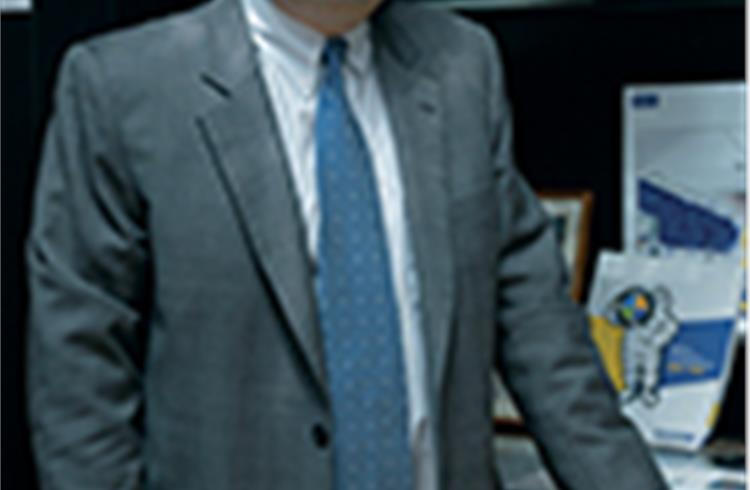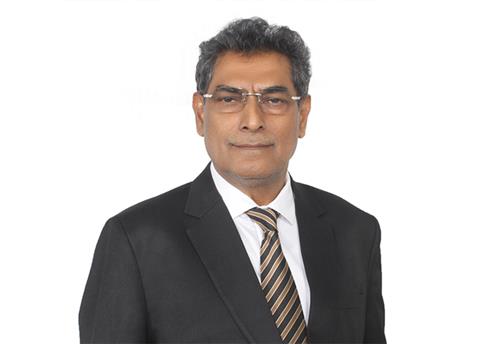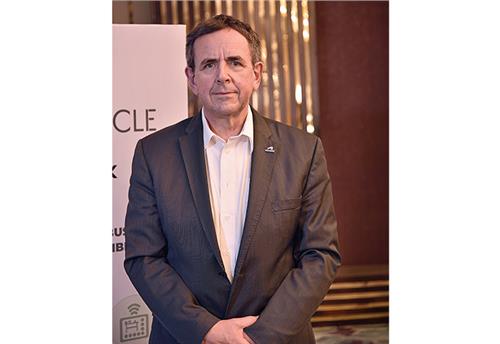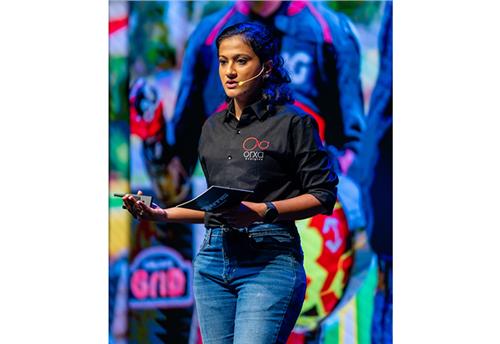Herve Dub, CEO, Michelin Apollo Tyres
There is huge potential in India’s radial tyre industry, says Herve Dub, CEO, Michelin Apollo Tyres, in a conversation with P Tharyan.
Why have Apollo and Michelin re-aligned their business in India?
While the two companies have high respect for each other’s business interests, it was important to re-allocate our respective resources to more immediate projects to ensure growth. Michelin will continue to pursue its objective to be a leader in the radial truck and bus segment in India. We also plan to change our existing name as we have bought Apollo Tyres’s 49 percent stake in the JV and are now 100 percent owners. Michelin and Apollo will continue to maintain links but at the level of operational development of business.
How does Michelin plan to focus itself more aggressively in the Indian market?
The strategy for Michelin remains the same. Our focus is on the truck and bus industry and the opportunities lie in the radialisation process of India. There are 2.2 million trucks operating on Indian roads, moving 60 to 70 percent of total cargo in the country. With increasing GDP, road transportation is also growing which in turn means more transportation of high-value goods. However, compared to other countries, the level of radialisation of trucks and buses in India is very low —it is 100 percent in western countries, 94 percent in the US, and 25 percent in China and Thailand. In India, it is less than one percent! We think there is a huge potential for radial tyres for trucks and buses, which are recording an increase in average speed. Furthermore, there is strong growth in production of new trucks and their horsepower is also increasing gradually. With the significant increase in price of diesel, the profitability of the trucking industry has been adversely affected. Radial technology is the right solution to cut the industry’s fuel bill and with our proven technology, we can bring significant benefits to the business.
When will the Ranjangaon plant be ready?
We have postponed the setting up of this factory. Market requirements will link the pace of this process of radialisation and our investment.
What is your strategy for growth?
We think our market-driven approach of understanding the needs of Indian consumers will be very profitable. We target different needs for different applications depending on factors like road surface. For instance, the requirements for the urban segment are different from the long haul highway or construction site and quarry segments. Radial technology provides low hauling resistance and ensures that vehicle engines consume less energy, thereby cutting costs. Michelin tyres lead to less fuel consumption, as much as 5 to 10 per cent less, in the right conditions. That does not mean we can convince the consumer to move on to Michelin radial tyres very easily or quickly. We have to talk to end users, inform them, make them aware of these benefits and finally ask them to try our products.
What is the existing product profile?
We currently import truck and bus tyres, designed for Indian road conditions, from a Michelin factory in China. We are also present in the passenger car tyre segment and offer a host of tubeless tyres like the Certis, Vivacy Comfort, Energy MXV8, Pilot Preceda, Pilot Sport and the LTX-AT, an all-terrain tyre. We are in the process of adding more products, imported from Thailand and Europe. Our tyres are sold through multi-brand dealers and through two networks of distributors — one for passenger cars and another for buses and trucks.
What is the road ahead for Michelin?
Initially the Ranjangaon plant project was designed for truck and bus tyres. At the moment, Michelin is not OE to manufacturers and commercial vehicle manufacturers like Ashok Leyland and Tata Motors are not using our tyres. The same goes for carmakers like Toyota, Honda, Hyundai and Tata Motors but I am confident this will change.
Don’t you think Michelin needs to increase its brand awareness in India?
Yes, we need to increase our brand awareness here. It is very important, not only to sell passenger car tyres but also to promote radial technology. You will soon start to see a little bit more of Michelin in India.
Do you see any impediments to Michelin's growth in India?
There are several obstacles to the radialisation process in India. The quality of roads and vehicle condition and their poor maintenance also do not facilitate introduction of this new technology. We know that some of the existing factors in India will evolve in a positive manner. The question is how fast. Radialisation is a change of technology and any change is never easy. People may be aware of the advantage of radial tyres but then it is not easy to measure this. Our products are priced higher than our competitors but then there is a higher price to be paid for a better technology.
RELATED ARTICLES
BRANDED CONTENT: 'We aspire to be among the leading sensors and electro-mechanical products manufacturer'
P. Parthasarathy, Founder & Managing Director, Rotary Electronics Pvt Ltd shares the company's commitment and vision to ...
‘Big opportunity for startups lies in products in India’: Detlev Reicheneder
As electrification levels the playing field, the focus on tech and R&D to bring innovative products is the mantra for st...
'I hope my journey makes people say — I can do this too'
Ranjita Ravi, Co-founder of Orxa Energies — the maker of Mantis e-bikes — shares the challenges of building a startup an...





 By Autocar Pro News Desk
By Autocar Pro News Desk
 30 Jun 2006
30 Jun 2006
 3758 Views
3758 Views









